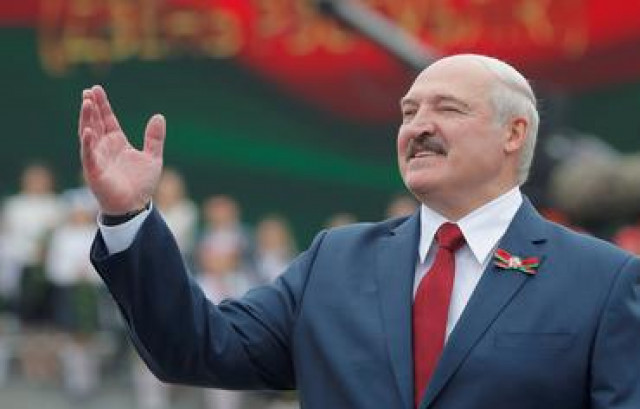 Ukraine reports 5,276 new COVID-19 cases
Ukraine reports 5,276 new COVID-19 cases
 Zelensky: Every third Ukrainian considers road construction one of greatest achievements of 2021
Zelensky: Every third Ukrainian considers road construction one of greatest achievements of 2021
 Ukraine ready to implement Minsk agreements, but Russia's desire needed - Yermak
Ukraine ready to implement Minsk agreements, but Russia's desire needed - Yermak
 Michel: EU unanimously agree to roll over economic sanctions against Russia
Michel: EU unanimously agree to roll over economic sanctions against Russia
 Actions by Ukraine's partners will help prevent worst-case scenario - Zelensky
Actions by Ukraine's partners will help prevent worst-case scenario - Zelensky
 COVID-19 in Ukraine: Health officials confirm 8,899 daily cases as of Dec 17
COVID-19 in Ukraine: Health officials confirm 8,899 daily cases as of Dec 17
 Macron tells Zelensky he declared support for Ukraine in call with Putin
Macron tells Zelensky he declared support for Ukraine in call with Putin
 Zelensky, Scholz discuss gas transit through Ukraine after 2024
Zelensky, Scholz discuss gas transit through Ukraine after 2024
 Ukraine ready for any format of talks with Russia - Zelensky
Ukraine ready for any format of talks with Russia - Zelensky
 Ukraine’s only journalist in Russia facing extremism charges - lawyer
Ukraine’s only journalist in Russia facing extremism charges - lawyer
 PM Shmyhal: First two applications for investment projects worth $96 million filed
PM Shmyhal: First two applications for investment projects worth $96 million filed
 Zelensky, PM of Italy discuss security situation around Ukraine
Zelensky, PM of Italy discuss security situation around Ukraine
 President signs off State Budget 2022
President signs off State Budget 2022
 London considering all options for responding to Russia's aggression against Ukraine
London considering all options for responding to Russia's aggression against Ukraine
 Putin, Biden to hold another round of talks
Putin, Biden to hold another round of talks
 Some 260,000 Ukrainians “victims of human trafficking” over 30 years - prosecutor general
Some 260,000 Ukrainians “victims of human trafficking” over 30 years - prosecutor general
 Ukraine plans to create center to protect energy infrastructure from cyber attacks
Ukraine plans to create center to protect energy infrastructure from cyber attacks
 No clear idea so far when Normandy Four top diplomats set to meet - German Ambassador
No clear idea so far when Normandy Four top diplomats set to meet - German Ambassador
 Ukraine receives EUR 600M in macro-financial assistance from EU
Ukraine receives EUR 600M in macro-financial assistance from EU
 Zelensky holds phone conversation with PM of Israel
Zelensky holds phone conversation with PM of Israel
 Ukraine sets new daily COVID vaccination record
Ukraine sets new daily COVID vaccination record
 MFA: European Union has not yet removed Ukraine from list of safe countries
MFA: European Union has not yet removed Ukraine from list of safe countries
 Kyiv records 1,023 new COVID-19 cases, 29 deaths
Kyiv records 1,023 new COVID-19 cases, 29 deaths
 G7 ambassadors welcome adoption of law on NABU status
G7 ambassadors welcome adoption of law on NABU status
 Ukraine can increase Covid vaccination rates to 1.5M a week – Liashko
Ukraine can increase Covid vaccination rates to 1.5M a week – Liashko
Under President Alexander Lukashenko, the average monthly wage in Belarus has risen in dollar terms to $500 from $50 in 1999. For voters, there’s just one problem: it hit $500 in 2010, and has been stuck there ever since.
As Lukashenko, a 65-year-old former collective farm manager with a fondness for a Soviet-style command economy, seeks re-election on Sunday after 26 years in power, his economic record is being found wanting by some voters.
“My daughter tells me all the time: I love my country, I want to live in my country,” said Dmitry, a 53-year-old Minsk resident protesting against Lukashenko last week.
“But with what is happening here, there are no prospects for young people. No future,” he said, saying his daughter lived in the Czech Republic and had no plans to return.
He declined to give his surname for fear of reprisals in a country where little dissent is allowed.
Once cast by Washington as “Europe’s last dictator”, Lukashenko controls the levers of power in the strategically important country between East and West through which Russia sends its oil. He is expected to be re-elected.
But he faces protests by opposition supporters rallying around his main opponent, a former English teacher whose husband was jailed and cannot run himself.
Lukashenko is also facing criticism over his human rights record and dismissal of COVID-19 as “a psychosis”.
His once popular promise of “$500 for everyone” was a reflection of rising prosperity in the 2000s, but has become the butt of internet memes.
“People are really sick of it, people want change, people want some kind of development,” said Vadim Iossub, a senior analyst at financial company Alpari Eurasia.
Fraying ties between Belarus and Russia have prompted Moscow to scale back subsidised energy supplies that previously propped up Lukashenko’s rule, creating a $700-million budget hole as the coronavirus pandemic tipped the economy into recession.
Hundreds of thousands of Belarusians have moved abroad in recent years. Lukashenko said on Tuesday the population had fallen by 8%.
























































































































